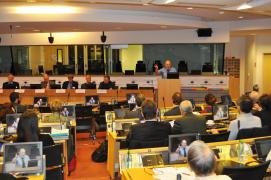
Day 2 of the final conference began at the European Economic and Social Committee with the theme of "Moving forward on environmental crime – perspectives and recommendations". Moderator Rob de Rijck, National Coordinating Prosecutor for Environmental Criminal Law, Dutch Public Prosecution Service / Member, EFFACE Advisory Board, led the session.
See photos from the final conference
The core conclusions and recommendations were presented in this session.
Proposals presented for the EU level included:
- The fact that environmental crime has been committed in the context of organised crime should be considered an aggravating circumstance in the Environmental Crime Directive.
- Rules on the confiscation and forfeiture of the proceeds of environmental crime should be adopted at the EU level.
- Impose an obligation on Member States to provide data on the number of violations, prosecutions and imposed sanctions for violations of national provisions implementing European environmental law, commonly referred to as the environmental acquis.
Proposals presented for the EU level included:
- Promote effective sanctions, including civil and administrative sanctions (also fines).
- Introduce and use complementary sanctions and measures.
On Improving enforcement, cooperation and data collection, the following proposals were presented:
- Make environmental crime a priority both at the EU and at the Member State level.
- Member States should provide for specialisation of prosecution and adjudication.
- The EU should set minimum criteria for inspections and monitoring.
The importance of adequate and accessible data for environmental crime was also highlighted. Smart environmental crime enforcement relies on data to direct resources to where they are most needed; for example what, where and when to inspect. One core recommendation on data is to impose an obligation on Member States to provide data on the number of violations, prosecutions and imposed sanctions for violations.
MEP Helmut Scholz said in his presentation that in 2016 impunity for environmental crimes remained a fact at the international and EU level. He continued that citizens have become aware that the television images of waste in the streets of Naples are not only an Italian problem. When organised crime illegally dumps this waste somewhere in a neighborhood, it is realised that there should be better law enforcement structures ready for combat across the EU. However the recent years of economic crisis and the pressure on public budgets have certainly led to a backlash regarding environmental policies.
How to best facilitate the role of NGOs and civil society in combatting environmental crime was the focus of the late morning session. Some of the important functions of NGOs stated are in mobilising populations, and to generate and share expertise. Other roles of NGOs in protecting the environment led to the question of what can make NGOs more effective? One is how well the issue on which the NGO works is framed and communicated. Secondly the networks of connections are important in reaching the right stakeholders. Finally, the amount of influence that the NGO has built in its work and how it capitalises on opportunities also impact effectiveness.
One example of the local effect that an NGO can have was that empowering NGOs to claim damages in courts provides incentive to companies to operate more responsibly in their impact on the environment.
The afternoon session worked to identify the political opportunities and challenges for the EU to take further action to combat environmental crime. Regulations, penalties and harmonisation were discussed. on the law enforcement aspect, it was noted that at the national level, the EU should increase pressure on Member States to gather intelligence, because if there is no national data, then Europol will not have the useful information with which to work. Development of enforcement strategy guidelines and the training of enforcement personnel at all levels is important in a cohesive approach. In addition, environmental crime should be prioritised and not just a part of routine police operations. If it is not examined closely in this capacity, then it will not be seen and addressed properly.
The Lacey Act in the United States was mentioned on a number of occasions as being a good model that could be applied in the European Union. One participant called for the EFFACE project to push for Europe to adopt the Lacey Act. Another point of the discussion was tracing waste disposal and verification of proper procedures, as this is often a well-hidden situation fed by large sums of money.
The final session featured Monica Frassoni, Co-Chair of the European Green Party. Participants discussed the way forward in the EU on fighting environmental crime. Issues such as long-standing waste operation violations with no present solution were examined. It was also brought up that minimum environmental crime sanctions should be implemented in the EU, although the value and desirability of this approach has been debated in the project.
About the conference:
"Combatting Environmental Crime: Priorities and Opportunities for further EU Action" is the theme of the EFFACE final conference in Brussels on 17-18 February 2016.
The conference brings together key stakeholders involved in addressing environmental crime at the local, national, European and international levels. Participants include legal, judicial and crime experts; environmental policy experts; EU and Member State policy makers, customs and law enforcement officials; representatives from civil society / NGOs; and others.
The programme includes sessions on:
Key conclusions and recommendations from EFFACE, (including from case studies on wildlife, logging, fishing, mining, wastes, etc.);
Priorities for further action by the EU; and
Facilitating the role of NGOs and civil society in combatting environmental crime
See also a report on Day 1 of the EFFACE Final Conference.
For further information, please contact the conference organisers at: news@efface.eu









